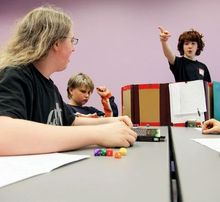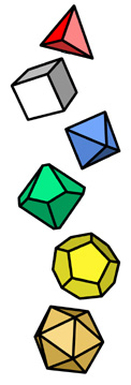Role-Playing Games (RPGs)
Role-playing has been actively used in libraries almost as long as library programming! Storytelling, readers' theater and other manners in which dramatic interpretations occur have long been included in library programming. But games (and role-playing games in particular) are something that, until quite recently, librarians have been wary of promoting. Even with the American Library Association's National Gaming Day promoting (and funding) game-based library programs across the nation, role-playing games continue to be one of the most underplayed programming possibilities.
Research

Role-playing seems to have as many proponents as it has vehement detractors. In libraries, RPGs prove to be rather challenging programs to implement. The gaming groups tend to be small, the learning curve can be intimidating, and RPGs take A LOT of time. Provided there are regular gaming sessions, one game could take weeks or months to complete!
If that hasn't scared you off this type of programming, here's the perks:
It has long been established as a type of gaming that encourages reading, enhances math skills and promotes socialization with youth who historically struggled to find their niche elsewhere. RPGs are sneaky educators. Reluctant readers and reluctant mathematicians will not even realize that they invest an hour or two (or three!) into a game that requires them to read, write, calculate, speak, act, and create.
In "Remaking Each Other's Dreams: Player Authors in Digital Games", Cindy Poremba notes that a game’s worth is not contingent on its popularity but, rather, on how well the game allows for both expression and extension of game culture. Whether online multiplayer RPGs or the table top equivalents, this genre of game is, ultimately, about creation: character and world creation. By "insisting the player's agency exists through the medium [of the game and game creation]," RPGs promote essential aspects of young adult development by allowing teens to grapple with their identity in the non-threatening environment of the game space while also empowering them to be flexible and dynamic. Game programs, naturally, fulfill several of the competencies for Young Adult Librarians by promoting "developmental needs of young adults...with young adult involvement" and fostering "informational and recreational services [that] direct their personal growth and development".
There are myriad personal accounts of how RPGs in libraries made a difference. 'EarlB,' one reader of Liz Danforth's "Table Top Role-Playing Games" stated: "I very much partly attribute my professional success to the fact that many years ago our library took the time to give us a place to develop our imaginations and fostered our interests instead of putting us 'to the streets.'"
RPG programming can be an innovative way to promote a library's current book collection. As Liz Danforth notes, many RPGs are often "based in and expanding literary settings". Also, a fair number of book series are based on such games: DragonLance, Forgotten Realms, WildCards, etc.
If that hasn't scared you off this type of programming, here's the perks:
It has long been established as a type of gaming that encourages reading, enhances math skills and promotes socialization with youth who historically struggled to find their niche elsewhere. RPGs are sneaky educators. Reluctant readers and reluctant mathematicians will not even realize that they invest an hour or two (or three!) into a game that requires them to read, write, calculate, speak, act, and create.
In "Remaking Each Other's Dreams: Player Authors in Digital Games", Cindy Poremba notes that a game’s worth is not contingent on its popularity but, rather, on how well the game allows for both expression and extension of game culture. Whether online multiplayer RPGs or the table top equivalents, this genre of game is, ultimately, about creation: character and world creation. By "insisting the player's agency exists through the medium [of the game and game creation]," RPGs promote essential aspects of young adult development by allowing teens to grapple with their identity in the non-threatening environment of the game space while also empowering them to be flexible and dynamic. Game programs, naturally, fulfill several of the competencies for Young Adult Librarians by promoting "developmental needs of young adults...with young adult involvement" and fostering "informational and recreational services [that] direct their personal growth and development".
There are myriad personal accounts of how RPGs in libraries made a difference. 'EarlB,' one reader of Liz Danforth's "Table Top Role-Playing Games" stated: "I very much partly attribute my professional success to the fact that many years ago our library took the time to give us a place to develop our imaginations and fostered our interests instead of putting us 'to the streets.'"
RPG programming can be an innovative way to promote a library's current book collection. As Liz Danforth notes, many RPGs are often "based in and expanding literary settings". Also, a fair number of book series are based on such games: DragonLance, Forgotten Realms, WildCards, etc.
Successful Programs

- Allen County Public Library in Fort Wayne, Indiana is dedicated to gaming! The programming calendar at this library has Game Nights for families once a week and 2-3 other gaming programs each and every week! One of the librarians, Ian McKinney, has also established a successful Dungeons & Dragons campaign. For five weeks each summer (for the past five years), McKinney and a group of teens meet to travel to new lands, fight creatures of darkness and enjoy some excellent library programming. Ian McKinney also has a blog that provides a full run-down of this program and how to do it yourself.
- In Glendale, Arizona, the Velma Teague Branch library has been sponsoring a summer teen RPG program. Twice a month, a group of teen tromp into the library to play the massively multi-player online RPG RuneScape. This event is a LAN party! The teens use interconnected computers at the library to play the game online for free.
Advice

If you're concerned about your budget, RPGs are a great way to start gaming groups! Many programs can be done for no more than the cost of the chips and soda you buy to entice those caffeine-crazed teens into your clutches. A variety of RPG basic instructions and implements can be made or downloaded from the Internet. The RPG Library is an archive of such bargain games. The Library RPG Project is another site that will send you off to a variety of quality RPGs with rock-bottom prices!
Although prices can be great, RPGs take a significant amount of time investment. Successful programs require dedicated staff members who will be present and participating in all gaming sessions. These programs do NOT run themselves!
Role-playing games tend to come with A LOT of rules. Learning those before trying to "teach" a game to patrons or sponsor a full programs can be tricky business. If you do not have the urge to learn a new gaming system, bringing in expert help from your local comic or game shop might save you hours of research and preparation time.
If you are ready to tackle goblins and fight dragons...or just learn how to play and present RPGs to patrons yourself, there are loads of resources out there to help you! The Young Person's Adventure League Project is a helpful resource for librarians. Many game publishers are also keen to help you take their products into the library. For example, Wizards of the Coast (the publisher for Dungeons & Dragons), has a web page dedicated to helping you get your library program up and running.
Although prices can be great, RPGs take a significant amount of time investment. Successful programs require dedicated staff members who will be present and participating in all gaming sessions. These programs do NOT run themselves!
Role-playing games tend to come with A LOT of rules. Learning those before trying to "teach" a game to patrons or sponsor a full programs can be tricky business. If you do not have the urge to learn a new gaming system, bringing in expert help from your local comic or game shop might save you hours of research and preparation time.
If you are ready to tackle goblins and fight dragons...or just learn how to play and present RPGs to patrons yourself, there are loads of resources out there to help you! The Young Person's Adventure League Project is a helpful resource for librarians. Many game publishers are also keen to help you take their products into the library. For example, Wizards of the Coast (the publisher for Dungeons & Dragons), has a web page dedicated to helping you get your library program up and running.
Page edited by Sam Sednek
